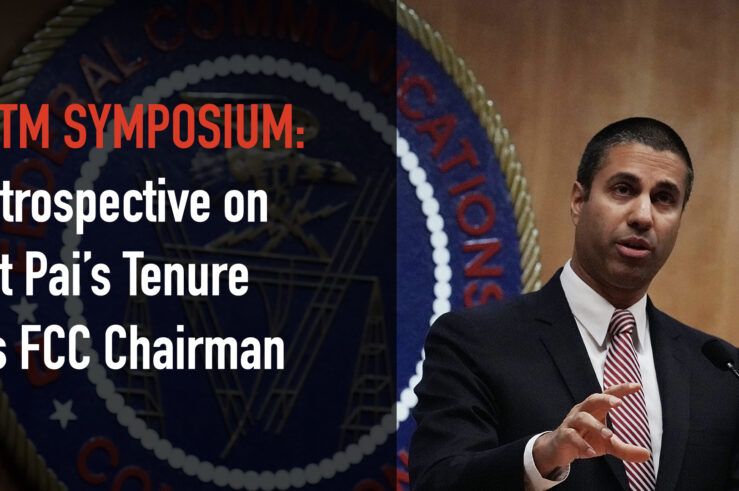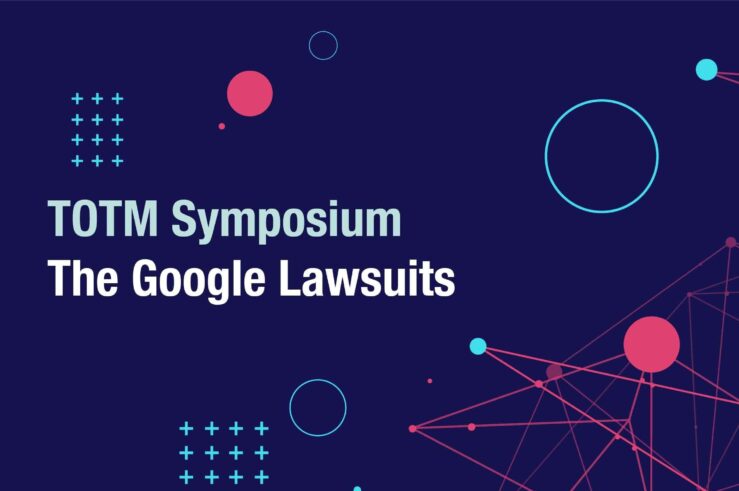Showing results for: “digital markets act”
Retrospective on Ajit Pai’s Tenure as FCC Chairman
As we ponder the changes to FCC policy that may arise with the next administration, it’s also a timely opportunity to reflect on the chairman’s leadership at the agency and his influence on telecommunications policy more broadly. Indeed, the FCC has faced numerous challenges and opportunities over the past four years, with implications for a ... Retrospective on Ajit Pai’s Tenure as FCC Chairman
The DOJ’s Antitrust Case Against Google: A Tough Slog, but Maybe an Intriguing Possibility?
The U.S. Department of Justice’s (DOJ) antitrust case against Google, which was filed in October 2020, will be a tough slog.[1] It is an alleged monopolization (Sherman Act, Sec. 2) case; and monopolization cases are always a tough slog. In this brief essay I will lay out some of the issues in the case and raise ... The DOJ’s Antitrust Case Against Google: A Tough Slog, but Maybe an Intriguing Possibility?
The Forgotten Strand of the Anti-Monopoly Tradition in Anglo-American Law
Admirers of the late Supreme Court Justice Louis Brandeis and other antitrust populists often trace the history of American anti-monopoly sentiments from the Founding Era through the Progressive Era’s passage of laws to fight the scourge of 19th century monopolists. For example, Matt Stoller of the American Economic Liberties Project, both in his book Goliath ... The Forgotten Strand of the Anti-Monopoly Tradition in Anglo-American Law
COVID-19 Vaccines Show the Patent System Works
With the COVID-19 vaccine made by Moderna joining the one from Pfizer and BioNTech in gaining approval from the U.S. Food and Drug Administration, it should be time to celebrate the U.S. system of pharmaceutical development. The system’s incentives—notably granting patent rights to firms that invest in new and novel discoveries—have worked to an astonishing ... COVID-19 Vaccines Show the Patent System Works
Trade Promotions in High Tech
As one of the few economic theorists in this symposium, I believe my comparative advantage is in that: economic theory. In this post, I want to remind people of the basic economic theories that we have at our disposal, “off the shelf,” to make sense of the U.S. Department of Justice’s lawsuit against Google. I ... Trade Promotions in High Tech
Why the Federal Government’s Antitrust Case Against Google Should—and Likely Will—Fail
On October 20, 2020, the U.S. Department of Justice (DOJ) and eleven states with Republican attorneys general sued Google for monopolizing and attempting to monopolize the markets for general internet search services, search advertising, and “general search text” advertising (i.e., ads that resemble search results). Last week, California joined the lawsuit, making it a bipartisan ... Why the Federal Government’s Antitrust Case Against Google Should—and Likely Will—Fail
The Case Against Google Advertising: What’s the Relevant Market and How Many Are There?
U.S. antitrust regulators have a history of narrowly defining relevant markets—often to the point of absurdity—in order to create market power out of thin air. The Federal Trade Commission (FTC) famously declared that Whole Foods and Wild Oats operated in the “premium natural and organic supermarkets market”—a narrowly defined market designed to exclude other supermarkets ... The Case Against Google Advertising: What’s the Relevant Market and How Many Are There?
Building the Digital Future: Can the EU Foster a Dynamic and Crime-Free Internet?
The European Commission has unveiled draft legislation (the Digital Services Act, or “DSA”) that would overhaul the rules governing the online lives of its citizens. The draft rules are something of a mixed bag. While online markets present important challenges for law enforcement, the DSA would significantly increase the cost of doing business in Europe ... Building the Digital Future: Can the EU Foster a Dynamic and Crime-Free Internet?
The Antitrust Prohibition of Favoritism, or the Imposition of Corporate Selflessness
It is my endeavor to scrutinize the questionable assessment articulated against default settings in the U.S. Justice Department’s lawsuit against Google. Default, I will argue, is no antitrust fault. Default in the Google case drastically differs from default referred to in the Microsoft case. In Part I, I argue the comparison is odious. Furthermore, in ... The Antitrust Prohibition of Favoritism, or the Imposition of Corporate Selflessness
Google and Shifting Conceptions of What It Means to Improve a Product
Judges sometimes claim that they do not pick winners when they decide antitrust cases. Nothing could be further from the truth. Competitive conduct by its nature harms competitors, and so if antitrust were merely to prohibit harm to competitors, antitrust would then destroy what it is meant to promote. What antitrust prohibits, therefore, is not ... Google and Shifting Conceptions of What It Means to Improve a Product
Symposium on the Future of American Antitrust: The Google Lawsuits
The U.S. Justice Department (DOJ) has brought a case alleging that Google’s deals with Android smartphone manufacturers, Apple, and third-party browsers to make Google Search their default general search engine are anticompetitive (ICLE’s tl;dr on the case is here), and the State of Texas has brought a suit against Google’s display advertising business. These follow ... Symposium on the Future of American Antitrust: The Google Lawsuits
Introductory Post: The United States v. Google
Google is facing a series of lawsuits in 2020 and 2021 that challenge some of the most fundamental parts of its business, and of the internet itself — Search, Android, Chrome, Google’s digital-advertising business, and potentially other services as well. The U.S. Justice Department (DOJ) has brought a case alleging that Google’s deals with Android ... Introductory Post: The United States v. Google








